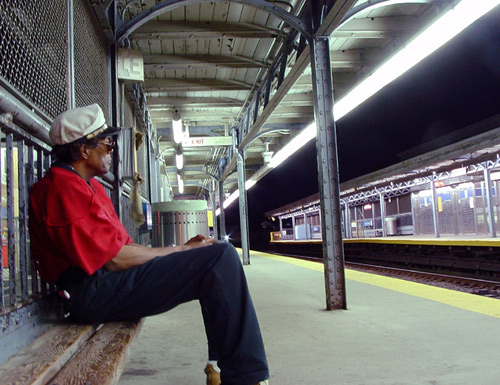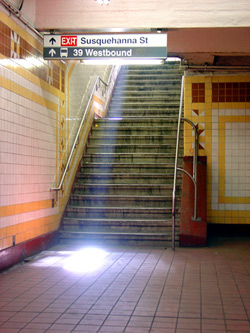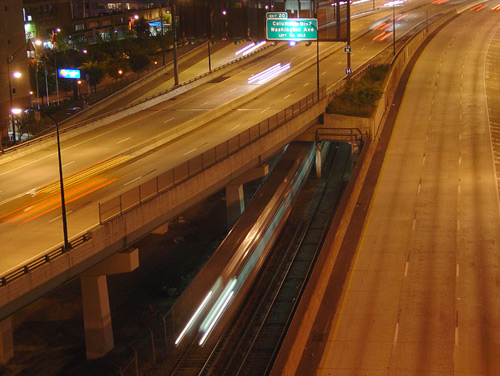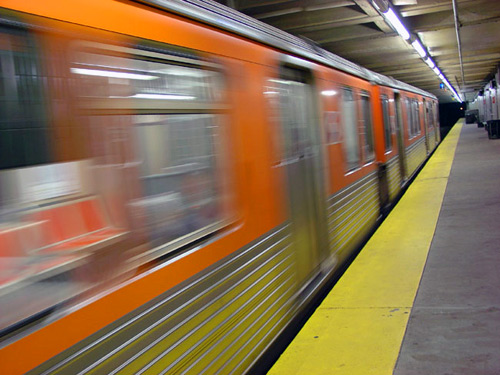|
|
|
9 July 07: Fare game

by Steve Ives
July 9, 2007
There are many things about living in this fair city of ours that can be described as both barely tolerable and strangely loveable.
That homeless dude with the ball cap who hangs out under The Clothespin.
Hurricane Schwartz's bow tie.
Loose granite tiles at LOVE Park.
Pat Burrell.
But among all things cosmically imperfect and uniquely Philadelphian, nothing so universally stirs the grits of the average Philadelphian like
SEPTA and like so much that we have come to grudgingly accept about living here, few of us realizes how far reaching its influence is on people who
have never ridden a bus or train and how truly integrated it is with the fabric of our city and just how much the problems it now faces impact the
city and region as a whole.
 For many, both individuals and businesses alike, SEPTA is as vital a part of their economic well being as the tools they use and the relationships
they establish. Transportation has always been an essential component of commerce and in the decentralized world we have crafted for ourselves,
efficiency and reliability are the most indispensable qualities of any means of transport.
For many, both individuals and businesses alike, SEPTA is as vital a part of their economic well being as the tools they use and the relationships
they establish. Transportation has always been an essential component of commerce and in the decentralized world we have crafted for ourselves,
efficiency and reliability are the most indispensable qualities of any means of transport.
Unfortunately for those of us who, by choice or by chance, have made SEPTA an integral part of our lives, the dedication we give to the system --
our time, our money, our concern -- is often poorly reciprocated and the result of this one-sided relationship has been a riding public that is
fiercely critical of the system itself and intensely mistrustful of the people charged with seeing that it runs efficiently and reliably. The
latest example of this perceived lack of respect comes in the form of the 16th edition of SEPTA vs. Harrisburg: The Money War.
On any random train or bus during any random afternoon commute, eliciting the opinions of merely a handful of people could result in enough horror
stories and justified complaints to fill tomes. And virtually every one of the complaints would find its origin in the system's funding -- or the
lack thereof. We use a system that is perpetually underfunded, that is perpetually unable to fully execute its charge because the resources that it
needs to do so are never fully supplied and that which it does receive has to do more for more with every passing year and this is not a new
problem.
1991 saw the ratification of Act 26 in Pennsylvania's General Assembly, an act establishing a dedicated revenue source for mass transit in The
Commonwealth. Although looking good technically when written, the execution of the measure failed to collect all the funds originally promised.
1997's Act 3 failed to fill the gap because it failed to keep pace with inflation. Even capital projects such as system expansion and modernization
have fallen by the wayside in many regards because of SEPTA's inability to match federal funds, a situation caused by Harrisburg's continued
clenching of the purse strings. The portion of SEPTA's operating expenses that comes directly from the farebox -- what you and I pay for tokens,
tickets and passes -- is far greater than the national average. Combine that with SEPTA taking in considerably less from state subsidies than most
large transit systems and you have the perfect storm to sink a public transit authority. All of this despite the fact that ripple effect public
transit has in the commonwealth financially can be measured with the word billion.

This situation has led to the annual Capital circus and it's only gotten worse with each passing year and despite the obvious approach of solving a
problem outright as opposed to continually placing a band-aid on a shark bite, we've all been -- year after year -- watching the whole mess emerge,
grow to crescendo and end, anti-climactically, with an eleventh-hour reprieve and nothing more but the promise that the exact same show would repeat
itself within a year's time. This scenario has played out every year for the better part of a decade now and though it has hardened the senses of
many Philadelphians and the wills of many who have added hundreds, maybe thousands, of vehicles to our roads because SEPTA simply became an
unviable option to them, it has not became a situation of crying wolf. It has not lost the attention of people with the power to affect to the
problem. But it is important for those of us who do not have access to the halls of government that all we see and malign has its origins in
comprehensible, though outrageous, circumstances.
New routes, new vehicles, renovated stations, modernized fare collection and equipment (and possibly, just for my sake, the end of that curiously
Medieval term 'fare instrument') all come about from combinations of will, money and cooperation. For far too long, SEPTA did without money and
cooperation. It cannot be said that the will to make big projects happen is not alive at 1234 Market Street but such will is tempered by the hard
reality that the system simply doesn't have the money, honey. SEPTA, and indeed, all mass transit providers in Pennsylvania, make their annual plea
to a legislature that seems to show them a great deal of ambivalence at best. Sometimes, what occurs can be interpreted as thinly veiled hostility
towards large communities and big cities which are seen as being voids which suck money away from other 'worthwhile endeavors' (all the while
forgetting that the largest city of them all by itself contributes ¼ of the bounty of state coffers) and leaving these places and these
people largely relying on their 'altruism' as if they're providing a favor as opposed to upholding their responsibilities.
When SEPTA says that they've trimmed down operational excess, that they've leaned down to fighting weight and have met the requirements handed down
to them to receive what they need to work with, I believe them. And believe me when I tell you I have no reason to just 'believe' SEPTA. The
Authority has earned the benefit of the doubt from absolutely no one among the general public but the figures and common sense do all the talking.
The simple facts are these: Fares go up, ridership goes down. Fares go up to maintain service levels, which causes ridership to go down, which
causes fares to go up and service to be cut, which causes ridership to go down . . . and so on. It's slow fiscal suicide and even SEPTA
isn't that nihilistic. And this doesn't even include the physical condition and personnel problems of the system which can repel potential and
current riders alike. We all know the problems, we know the solutions but when you look at just how bad the situation is one can't help but wonder
sometimes 'Is it worth it?'

The answer is, of course, yes. And the reasons are simple.
Our transit network, as wanting as it may be, is a planning marvel. Only a handful of U.S. cities operate systems of the same depth and scope. It
is not possible to take transit from one end of a city to another or from one end of a region to another in many places. But it's possible here,
despite what the devil on your shoulder says. Center City's splendid resurgence, the burgeoning growth of University City, the relevance of
neighborhoods that in some cases wouldn't be more than lifeless blocks of brick boxes and the connection of suburban hubs of commerce with the
center of the region would not be as we know them without a viable system to get people around and to them. Customers would have a harder time
patronizing businesses, people who have no choice but to get that job 15 miles from their home, the people who often make up the support structure
of the industries that make this region, have harder times finding or getting to it, quaint and "funky" neighborhood streets become de facto
traffic arteries -- all the same bad things you've heard in the past. So to simplify it -- by killing a transportation network you effectively
sentence a city to death. By not supporting it or never building it you effectively strangle a city's potential for growth and endanger its
sustained well being. Don't believe me? I could point you to a few examples in Michigan.
SEPTA is the X-factor that makes the city I've lived in and loved my entire life and which has enchanted many a newcomer work. Without it, we gain
gridlock and lose ease of circulation. We lose our loveable gruffness and gain frayed ends. We lose both that lively core of ours and neighborhoods
largely devoid of off-ramps, overpasses and sound barriers and gain . . . Robert Moses' opus. These things may sound like points on a worst-case
scenario list but one need only look at cities trying to build the type of network we take for granted daily to see exactly how real and how bad it
gets, particularly cities of the same physical size and scale.
We can needle, we can push, we can prod and we can hope and ultimately that is all that we as citizens can do. We can't sign our names and we can't
enter debate on this most crucial of issues, this issue that, if left unresolved, could see its impact felt in all corners of economic life in this
commonwealth. The people that we have charged to do the right thing know exactly what that is and know exactly how to do it. All that stands
between resolution and impending doom is political will, something we all know can become amazingly malleable when the right people talk loud
enough and long enough. We have allies right where we need them to get this madness to end. Let's hope they don't leave us a dollar short for bus
fare. If they do, we can remind them who pays for their ride to work.
–Steve Ives
phillytrax@aol.com
STEVE IVES ARCHIVES:
|
|
|